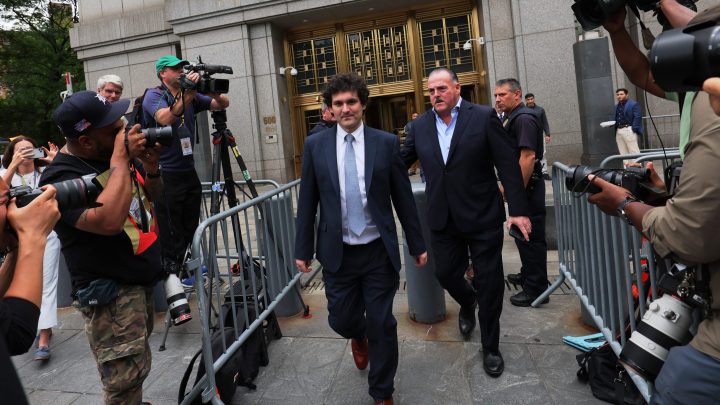
What to know about the Sam Bankman-Fried trial
What to know about the Sam Bankman-Fried trial

The first of two trials against Sam Bankman-Fried begins on Tuesday in New York. Bankman-Fried is the founder and former CEO of the cryptocurrency exchange FTX, which went bankrupt in November. Bankman-Fried is alleged to have committed fraud — in large part through Alameda Research, the trading firm that he also founded.
For more on what to expect, we checked in with Sujit Raman, the chief legal officer at TRM Labs, a blockchain and Web 3 analytics company that helps organizations spot crypto and other financial crimes. He recently spoke with “Marketplace Morning Report” host David Brancaccio. Below is an edited transcript of their conversation.
David Brancaccio: Lots of procedural stuff expected when a trial gets underway. I mean, what will you be looking for early on?
Sujit Raman: Well, I think what we’re going to have on the first day is jury selection. So, there won’t be a lot of excitement. I think opening statements are likely to begin on Wednesday. And that’s when the trial really begins. We’ll see if Mr. Bankman-Fried’s lawyers choose to put on an opening statement of their own. I anticipate they’ll probably stand up and make some kind of argument about how Mr. Bankman-Fried didn’t really know what was going on, he was inexperienced, he was in over his head, and that while there might have been a lot of mistakes at FTX, there wasn’t any criminal intent.
Brancaccio: Do you think the government would try to create the case that this was a Ponzi scheme?
Raman: Well, if the allegations are true, David, then it was certainly a massive embezzlement. You know, the way that FTX made money was by taking a fee. And that’s a perfectly legitimate business model. What’s not legitimate is taking the funds that customers custodied on the platform and then using that money for other purposes — like, hypothetically, buying a luxury penthouse apartment in the Bahamas. That’s what the government’s alleging happened here. And if that is, in fact, what happened, then those are very serious crimes.
Brancaccio: And if the trial bears this out, then it’s not really specifically about this being a cryptocurrency company or that it’s about digital assets. I mean, embezzlement can hit any kind of business.
Raman: That’s absolutely right. Fraud is fraud is fraud. And if that’s ultimately what happened here, I wouldn’t necessarily draw any connections to the crypto industry directly. That said, it’s obvious that once Mr. Bankman-Fried’s activities came to light, that did bring a lot more scrutiny to the digital asset sector. And I suspect that that continued scrutiny will continue in the weeks and months going forward.
Brancaccio: Early on, around the time of the FTX bankruptcy, there were vivid accusations that FTX was run in a slapdash way. Commentators after the bankruptcy suggested that this would now be the end of the Wild West phase of crypto. I mean, part of what you do is monitor this stuff. Are you seeing changes already?
Raman: Well, what we are seeing is an increased emphasis on compliance. So, I wouldn’t link that directly to the Sam Bankman-Fried case, but it is part of a broader recognition that digital assets are here. They’re here to stay. And governments around the world want to create regulatory structures for that activity. I think we do have a greater awareness of compliance in the digital assets industry, and I think spectacular flameouts like the FTX case only help push that idea forward.
Correction (Oct. 13, 2023): A previous transcript of this interview misspelled Sujit Raman’s name. It has been corrected.
There’s a lot happening in the world. Through it all, Marketplace is here for you.
You rely on Marketplace to break down the world’s events and tell you how it affects you in a fact-based, approachable way. We rely on your financial support to keep making that possible.
Your donation today powers the independent journalism that you rely on. For just $5/month, you can help sustain Marketplace so we can keep reporting on the things that matter to you.











